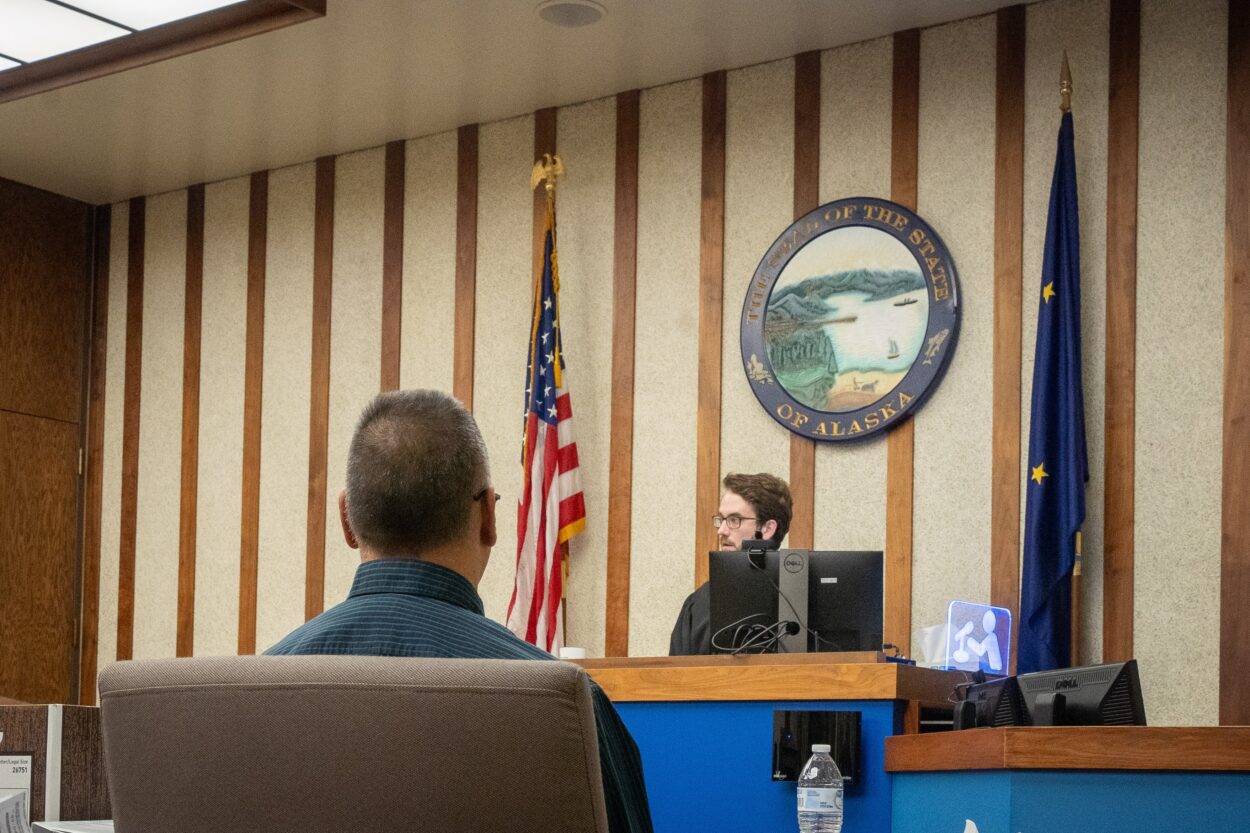
Following an emotional 6-day trial, a Ketchikan Superior Court closed the book on a 30-year cold case that had haunted the city. Michael J. Williams of Saxman was found guilty of first-degree sexual assault and second-degree sexual abuse of a minor. He faces a sentence of up to 30 years in prison.
Note: This story could be triggering for some listeners as it contains details of sexual assault. Identifying details of the victim have been intentionally left out of this story as KRBD’s policy is to not to identify victims of sexual assault without express permission.
In January of 1993, a 14-year-old girl was walking across Dudley Field near Ketchikan’s high school. It was dark and raining, turning the snow on the ground to slush.
As she crossed the field, a man in green fishing-style raingear and a black scarf wrapped around his face grabbed her from behind and pulled her into the dugout. He told her that he had a knife and would use it on her if she called for help. He raped the girl and then fled.
Samples were collected from the 14-year-old survivor at the time, but the case went unsolved for decades.
Prosecutor Erin McCarthy, who is also the Assistant Attorney General for the state’s Cold Case Unit, said charges against Michael J. Williams come after years of advances in DNA forensics.
“[Williams] disappeared into the dark that night, and efforts to find the assailant went cold. For 30 years,” she told the jury in her opening statement.
Jerry Siefert was an officer in the Ketchikan Police Department in the 90’s assigned to the case. He testified that in the 30 years this crime went unsolved, he hadn’t been able to forget it.
“It’s one of those cases that have followed me over the decades that had been unsolved. It comes to mind probably two to three times a year even,” he said on the stand.
Dr. Ernie Meloshe, the emergency room physician who performed the sexual assault exam on the victim, also testified. Ketchikan is a small community and Meloshe said he has interacted with the victim multiple times since the night in question.
“In my heart, I’ve been thinking about her, caring for her for 30 plus years. But I’m really getting old.”
Meloshe stressed that his memory has degraded but when asked if he remembered the victim coming into the emergency room that night, he paused and replied: “Exquisitely.”
DNA evidence was a linchpin in the state’s case against Williams. The kit taken from the victim was tested as part of the state’s push to clear its sexual assault kit backlog. After multiple decades without a hit, Michael J. Williams was a match.
Cheryl Duda, who manages DNA analysis in the state crime lab, testified that the match between the DNA in the rape kit and Williams’ profile was unique.
“And in each case, the estimated frequency of the genetic profile was rarer than one in 330 billion. In other words, it’s a very rare profile,” she told the jury.
But does DNA degrade over 30 years? Duda says it can, when exposed to moisture, sunlight, or bacteria.
“All of those are things that can break the DNA into smaller pieces. We refer to that as ‘degrading’ the DNA. However, if you store a biological sample in a cool, dry, dark place, it may be possible to get DNA results from items that are decades old,” Duda told the jury, adding that the Alaska State Crime Lab manages for that.
Still, defense attorney Leif Thompson cast doubt on the DNA evidence throughout the trial. He noted that the case had no eyewitness or “smoking gun.”
“It’s a case entirely based on the science,” Thompson declared. “And nobody believes in anything other than a DNA report. If anybody thinks Mr. Williams did it, it’s for no other reason.”
After nearly a week of testimonies, the prosecution rested. The trial returned to session the following Tuesday and by the end of the day, Williams was found guilty.
Thompson argued in his closing statement that because of the lack of eyewitness details, much of the state’s evidence beyond the DNA was conjecture. He also claimed that the state’s chain of custody on the DNA evidence was speculative and that blindspots in forensic testing made the statistics provided by the state’s DNA analyst misleading.
“Treat this case like one of the more graver and important affairs of your life, because this is a graver and more important affair for all the people involved,” Thompson urged the jury. He concluded by reminded them about their duty not to convict on suspicion alone. “And I asked you to resolve all reasonable doubts in favor of Mr. Williams. And to find him not guilty of these two horrible crimes.”
In her rebuttal, McCarthy said that Thompson’s arguments were not founded in evidence or testimony and thus, William’s guilt was beyond a reasonable doubt.
After closing arguments, the jury deliberated for about an hour. They returned with a verdict of guilty on both charges, plus aggravating factors, meaning there were additional circumstances in the crime that should make for a stricter sentence.
Williams was handcuffed and led from the courtroom to the Ketchikan Correctional Facility where he’ll be held without bail pending sentencing which is scheduled for April 29.
Get in touch with the author at jack@krbd.org.








